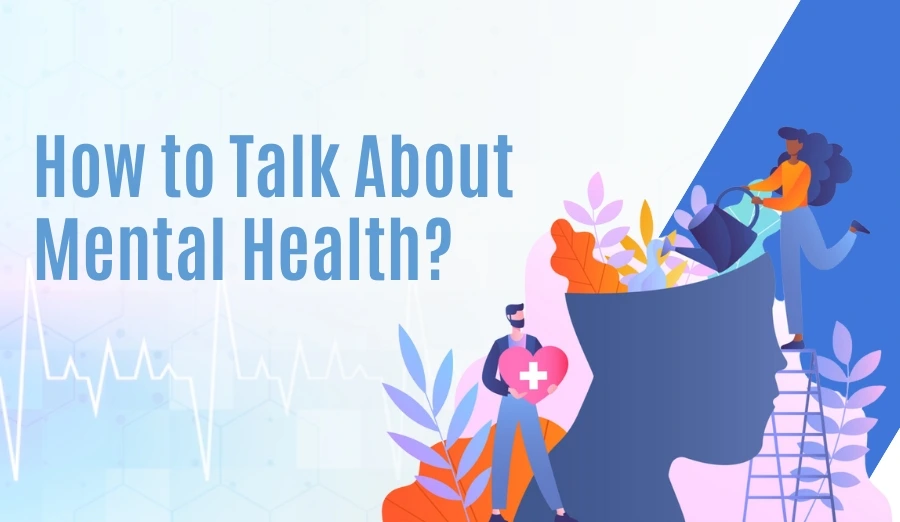-
129, Block-A Bangur Avenue, Mousumi Appartment, Kolkata 700055
129, Block-A Bangur Avenue, Mousumi Appartment, Kolkata 700055

Hello Reader!
Welcome to the blog page of Mind’s Eye of Dr. Rupa Talukdar, one of the best psychological counsellor in Kolkata.
Mental health is an essential aspect of overall well-being, yet discussing psychological issues remains a challenge for many. Despite increasing awareness, stigma, and misconceptions continue to prevent open conversations about mental issues. As the Best Psychological Counselor in Kolkata, I, Dr. Rupa Talukdar, believe that addressing mental health concerns openly and effectively is the first step toward healing and resilience. In this blog, we will explore how to talk about mental health in a meaningful and supportive way.

Discussing mental health helps break the stigma surrounding psychological issues and encourages those struggling to seek help. Here are some key reasons why open conversations about mental issues are crucial:
The environment in which you initiate a conversation about mental health matters. Select a calm, private, and comfortable setting where the person feels safe to express their thoughts and emotions.
Use open-ended questions to encourage meaningful discussions rather than asking direct or intrusive questions. For example:
When someone opens up about their mental issues, it is crucial to listen attentively without interrupting or passing judgment. Show empathy through nods, affirming statements, and maintaining eye contact.
Phrases like “just cheer up” or “it’s all in your head” can be hurtful and dismissive. Instead, acknowledge their feelings and validate their experiences by saying:
While it is natural to want to solve a loved one’s problems, sometimes the best support is just being there. Let them know they can talk to a Best Psychological Counselor in Kolkata, such as those at Mind’s Eye if professional help is needed.
Mental health should be treated just like physical health. Encourage routine mental check-ups and open discussions about psychological issues without fear of stigma.
Understanding different psychological issues such as anxiety, depression, PTSD, and OCD can help in offering better support. Spreading awareness about these topics contributes to a more informed and accepting society.
While conversations can be helpful, professional intervention is sometimes necessary. Encourage individuals struggling with severe mental issues to consult the Best Psychological Counselor in Kolkata for expert guidance.

In many societies, discussing mental health is considered taboo. Overcoming this requires continuous efforts to spread awareness and normalize conversations.
Many people fear being judged or misunderstood. Creating a supportive environment where mental health is discussed without bias is essential.
Educating individuals about psychological issues and their impact is key to fostering a more accepting and understanding community.
Starting a conversation about mental health can be daunting, but it’s essential for fostering understanding and support. Here are some effective ways to initiate these discussions:
Selecting an appropriate environment is crucial. Opt for a quiet, comfortable space where both parties feel relaxed. This could be during a casual walk, over coffee, or in a peaceful room at home. Avoid distractions to ensure that the conversation can flow naturally without interruptions.
If you’ve noticed changes in someone’s behavior or mood, gently bring it up. You might say something like, “I’ve noticed you don’t seem yourself lately; is everything okay?” This shows that you care and are paying attention to their well-being.
Vulnerability can encourage openness. By sharing your mental health struggles or feelings, you create a safe space for the other person to express themselves. For example, you could start with, “I’ve been feeling a bit anxious lately, and I thought it might be good to talk about it”. This approach normalizes the conversation around mental health.
Instead of yes-or-no questions, use open-ended prompts that invite deeper discussion. Questions like “How have you been feeling lately?” or “What’s been on your mind?” encourage the other person to share more about their experiences. This approach fosters a more engaging dialogue.
Show genuine interest in what the other person is saying. Use empathetic statements such as “That sounds tough” or “I appreciate you sharing this with me.” Listening without judgment allows them to feel safe in expressing their thoughts and feelings.
Be mindful of your language; avoid phrases that may minimize their feelings, such as “Just pull yourself together” or “You’re just having a bad day.” Instead, remind them that mental health issues are common and affect many people at different times in their lives.
Let them know that you’re there for them beyond this initial conversation. You might say, “I’m here for you whenever you need to talk.” This reassurance can help them feel less isolated and more supported in their journey.

Supporting a friend who is struggling with mental health issues requires empathy, patience, and understanding. Here are some effective strategies to help you provide the support they need:
Acknowledge your friend’s emotions by letting them know that their feelings are valid. Use phrases like, “That sounds tough” or “I can see why you feel that way.” Validation helps them feel heard and understood, which is crucial during difficult times.
Sometimes, the best support you can offer is simply being there. Listen without interrupting, and show that you care through your body language and tone. Reflect on what they say to demonstrate your understanding, such as, “It sounds like you’re feeling overwhelmed”.
Instead of assuming what your friend needs, ask them directly how you can support them. This shows that you care and allows them to express their specific needs, which may vary from emotional support to practical assistance.
If your friend is open to it, gently suggest seeking help from a mental health professional. You can offer to help them find resources or accompany them to appointments if they feel comfortable with that.
Mental health challenges can make everyday tasks feel overwhelming. Offer to help with simple tasks like running errands, cooking meals, or even just spending time together doing enjoyable activities. This practical support can alleviate some of their burdens.
Understand that your friend may not always be up for socializing or engaging in activities. Be patient and continue to invite them to join you without pressuring them. Let them know that their company is valued whenever they feel ready.
Help your friend prioritize self-care by suggesting activities that promote well-being, such as exercise, mindfulness practices, or hobbies they enjoy. Engaging in these activities together can also foster a sense of connection and support.
If your friend confides in you about their struggles, respect their privacy by not sharing their situation with others unless they give permission. Trust is essential in these conversations.
Recognize that your friend may need time to process their feelings or may not be ready to talk immediately. Stay calm and reassure them that you are there for them whenever they need support.
Also Read: Spreading Awareness About Mental Health: A Mission of Mind’s Eye

Recognizing the signs that someone might be experiencing mental health challenges is crucial for providing timely support. Here are common indicators to look out for:

When discussing mental health, it’s essential to choose your words carefully to avoid perpetuating stigma or causing harm. Here are some insensitive statements to avoid:
This statement can trivialize the person’s feelings and suggest that they should simply change their thought patterns, which is often not possible for someone struggling with mental health issues.
This phrase implies that the individual has control over their mental health and can simply will themselves to feel better, which is not the case for many who experience mental illness.
While mental health issues are indeed related to brain function, this statement can minimize the real emotional and physical pain someone is experiencing.
This comment can invalidate a person’s feelings by suggesting that their internal struggles should be visible externally, which is not always the case.
Comparing someone’s struggles to others’ experiences can make them feel guilty or ashamed about their feelings, rather than supported.
While positivity can be helpful, this statement can come off as dismissive of the person’s legitimate feelings and struggles.
Labeling someone’s emotions as dramatic can undermine their experiences and discourage them from sharing their feelings in the future.
This suggestion may imply that the person is at fault for their condition due to inactivity or isolation, rather than acknowledging that mental health challenges can make socializing difficult.
This statement dismisses the legitimacy of mental health issues and reinforces harmful stereotypes about those who struggle with them.
Offering simplistic solutions to complex problems can come off as insensitive and may frustrate someone who is looking for understanding rather than advice.

Talking about mental health helps reduce stigma, encourages seeking help, and promotes emotional well-being.
Choose a private and comfortable setting, ask open-ended questions, and listen with empathy.
Avoid dismissive phrases like “just cheer up” or “it’s all in your head.” Instead, validate their feelings.
Gently suggest speaking with a mental health professional and offer to help find resources or accompany them.
Speak openly about mental well-being, share personal experiences if comfortable, and encourage mental health awareness.
Talking about mental health should be as normal as discussing physical health. By fostering open conversations, offering emotional support, and seeking professional help when needed, we can create a healthier and more compassionate society. If you or someone you know is struggling with mental issues, do not hesitate to reach out to the Best Psychological Counselor in Kolkata at Mind’s Eye. Professional guidance can make all the difference in leading a happier, healthier life.
For expert counseling and support, book a consultation today and take the first step toward mental well-being.